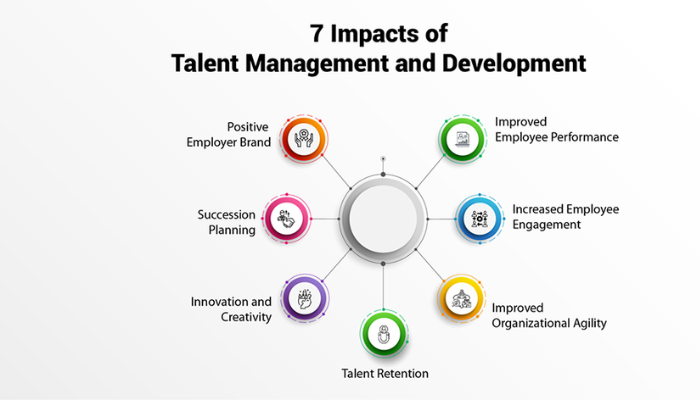Incorporating the benefits of talent management system into modern HR practices offers a multitude of advantages. By leveraging a Talent Management System (TMS), organizations can more effectively manage their workforce, leading to enhanced performance and competitive edge.
Advantages Of Talent Management Systems In Modern HR Practices:

TMS benefits include:
- Automation and optimization: TMS streamlines administrative processes, reducing manual tasks and ensuring compliance standards.
- Integrated HR data: A central data repository offers improved visibility, empowering HR teams with valuable insights.
- Sharing data: TMS supports the sharing of corporate knowledge, reinforcing communication and teamwork within organizations.
- Improved employee experience: HR interactions become interactive and intuitive, delivering an enhanced user experience for employees.
- Modern employee development: TMS inspires continuous learning and development, engaging employees and enabling career growth.
- Strengthened employee performance: TMS aligns talent policies with corporate goals, resulting in heightened employee productivity and organizational success.
- Advanced data analytics: TMS leverages data to drive informed decision-making for HR and business leaders.
- Enhanced compliance: Automation tools within TMS lessen the likelihood of human error and ensure policies and procedures are upheld.
- Significant time savings: Employing TMS reduces manual administrative workloads, allowing HR teams to concentrate on strategic agendas.
- Better succession management: TMS proactively identifies and develops high-potential employees, ensuring crucial roles remain filled.
- Increased employee engagement: TMS fosters a culture of collaboration and growth, empowering employees to contribute meaningfully to their respective organizations.
Making Decisions Based on Data in Modern HR Practices- Role of Talent Management Systems:
Talent Management Systems (TMS) centralize talent-related data, which helps HR make smart choices. TMS makes employee growth and planning better, which helps companies. Here are some ways TMS helps:
- Easier hiring steps
- Quick start for new workers
- Better planning for the team
- More workers stay and are involved
TMS also gives good info for managing how well employees do and planning who will take over important jobs.
With this info, leaders can fix skill shortages early, by hiring the right people and giving current employees new skills. This makes the workforce ready for change and helps the company do well in the future.
Leaders who are full of energy can look at detailed reports about the workforce. This helps find where new skills are needed and who could be good for a job. It also lets managers get ready to fill important jobs with people from inside the company.
TMS can also make employees more involved and sure about their careers by giving them more chances to learn and grow.
Simplifying the Recruitment Process:
- Talent Management Systems simplify the recruitment process in many ways, creating an efficient and strategic approach.
- Efficiency boosts recruitment, particularly through reduced “time-to-hire”.
- Automating candidate communication and interview scheduling improves recruitment efficiency and streamlines communications.
- Advanced filtering features enable the identification of highly qualified candidates from large applicant pools.
Enhancing Employee Experience Through Talent Management Systems:

Talent Management Systems (TMS) improve how happy employees are by giving them a nicer way to work, keeping an eye on their personal and job goals, and cutting back on how often they need to give progress reports.
- Employee Engagement: TMS makes it easier for companies to plan, keep track of, and talk about how well their talent strategies are working. This makes the relationship between employees and their bosses stronger.
- Goal Alignment: These systems let employees set their own goals and see how they’re doing. This makes them care more about their work and the company.
- Reduced Status Updates: TMS makes things like starting a job, checking on work, and learning new things happen by themselves. This means employees don’t have to go to as many meetings or write as many reports.
Aligning Talent Management with Business Strategy:
Talent Management Systems (TMS) bring the benefits of talent management systems into sharp focus by aligning employee skills with your company’s main goals. This alignment helps your business succeed through effective people management:
- Smart Recruiting: Hire people who match your business culture and goals.
- Training and Retention: Help your employees grow to support your business for a long time.
- Performance Development: Offer consistent feedback and opportunities to get better.
A good TMS makes sure employees do well in jobs that fit their skills and ambitions:
- Reducing Recruitment Costs: Find the right people for important jobs without spending too much.
- Improved Performance: Build teams that do great work and contribute to a strong company culture.
TMS helps your company make clear career paths that keep employees growing and staying with you:
- Identifying Learning Opportunities: Offer training that gets employees excited and helps them learn.
- Succession Planning: Keep your business running smoothly and hold onto important company knowledge.
With TMS, managers and employees have what they need to think strategically and chase shared goals:
- Centralized Data Management: Get valuable information that helps you make smart choices.
- Continuous Performance Management: Give feedback easily and make plans for personal growth based on good data.
Conclusion:
Using Talent Management Systems (TMS) helps companies build a strong strategy for finding, growing, and keeping good employees. The benefits of talent management systems are great because they make things work automatically, put all your data in one place, and make work better for your employees. They also make your employees more interested and productive.
In short, TMS starts a new chapter for HR teams, helping them make smart choices based on data and making hiring easier. They also help plan for the future of jobs and get people more involved in their work.
Remember this point from our talk – using a good Talent Management System can really change how HR works, and lead to better results for your business. To learn more about the benefits of Talent Management Systems, feel free to reach out to us at [email protected].




